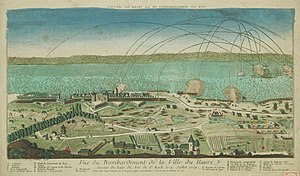Raid on Le Havre
| Raid on Le Havre | |||||||
|---|---|---|---|---|---|---|---|
| Part of Seven Years' War | |||||||
 The bombing of the port. |
|||||||
|
|||||||
| Belligerents | |||||||
|
|
|
||||||
| Commanders and leaders | |||||||
|
|
|
||||||
| Strength | |||||||
|
337 barges 12 Prams 8,000 troops (in area) |
||||||
| Casualties and losses | |||||||
| Low | Many barges destroyed 93 homes destroyed 400,000 pounds of damage |
||||||
The Raid on Le Havre was a two-day naval bombardment of the French port of Le Havre early in July 1759 by Royal Navy forces under Rear-Admiral George Rodney during the Seven Years' War, which succeeded in its aim of destroying many of the invasion barges being gathered there for the planned French invasion of Great Britain.
By the summer of 1759 the duc de Choiseul's invasion plans was under way with intensive naval preparations taking place along the French ports in the Atlantic and in the channel - Brest, Le Harvre, Rochefort and Toulon. Troops were assembled at number of points principally at Dunkirk, Saint-Omer, Ostend, Lille and Vannes. Choiseul had decided that the Le Havre was to be the main base for the Prince de Soubise's strike at England as it lay on the Seine and troop movement was far easier than any other French port.
The British had received intelligence that the French had a number of flat bottomed boats were prepared at Le Havre for the purpose of disembarking troops.
The squadron Admiral Rodney was detached in the beginning of July with a small squadron and sailed from Spithead on 2 July, arrived off Le Havre.
Rodney's squadron consisted of the 60-gun ship of the line Achilles as flagship, four 50-gun ships, five frigates, a sloop, and six bomb ketches. and anchored there placing the bomb vessels in the narrow channel of the river leading to Honfleur. The next day the attack commenced on the flat-bottomed boats and supplies which had been collected there. Over 3000 shells were fired at the principle targets - the magazines, batteries and the boats as well as into the town for fifty consecutive hours. Rodney, with some of his frigates, remained off the port for the rest of the year, and captured numerous prizes.
...
Wikipedia
